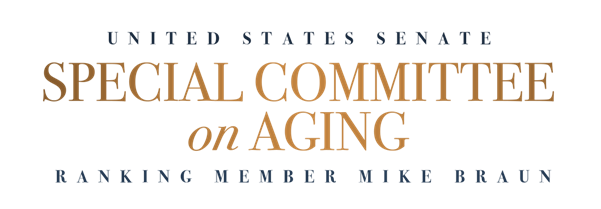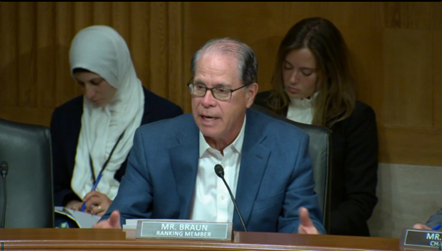Ranking Member Braun’s Opening Statement at Long-Term Care Workforce Hearing

FOR IMMEDIATE RELEASE
April 16th, 2024
Ranking Member Braun’s Opening Statement at Long-Term Care Workforce Hearing
WASHINGTON—Today, U.S. Senate Special Committee on Aging Ranking Member Mike Braun and Chairman Bob Casey held a hearing entitled, The Long-Term Care Workforce: Addressing Shortages and Improving the Profession. During the hearing, the Senators examined the issues faced by long-term care workers and methods to increase recruitment and retention within the workforce. The Senators highlighted how a robust long-term care workforce can improve the lives of care workers, the older adults and people with disabilities they care for, and the families and communities they support.
Remarks as prepared:
By 2030, older adults will outnumber children for the first time in our history.
We are already experiencing a shortage of long-term care workers and it is expected to get worse.
I am proud that Indiana is at the forefront of training the next generation of long-term care professionals.
Strada Education Foundation, based in Indianapolis, is transforming education by partnering with educators, policymakers, and employers to increase opportunities through work-based learning.
We need innovation at the state and local levels to meet this increased demand.
We don’t need the federal government forcing a one size fits all approach.
In September, the Biden Administration proposed staffing minimums for nursing homes, which would impact all long-term care providers.
It is estimated that over 80 percent of facilities do not currently have the staff required to meet the proposed minimum. This could force them to close their doors.
Today, we may hear other proposals for cumbersome federal regulations, requirements, and protections.
Giving more power to the federal government usually means printing more money and forcing top-down solutions.
These solutions are partisan and will not get us anywhere. We need to work together to pass bipartisan solutions that offer flexibility.
When it comes to protecting the healthcare workforce through OSHA, Democrats are pushing for duplicative requirements that have huge costs.
I introduced the Voluntary Protection Program (VPP) Act with Senator Bennet, which allows OSHA to work alongside employers and workers to encourage businesses to adopt stringent safety and health standards for their employees.
VPP sites have shown injury and illness rates 50 percent lower than industry averages, while saving employers $257 million.
To grow the long-term care workforce, the federal government should make it easier for people to enter by removing barriers.
Senator Kaine and I introduced the JOBS Act, which allows federal Pell grants to be used for high-quality, short-term job training, including for long-term care.
Senators Rosen, Collins and I introduced the Train More Nurses Act, which passed the Senate in January.
This bill reviews all nursing grant programs to find ways to increase nursing pathways.
Senator Klobuchar and I introduced the Skills Investment Act and the Freedom to Invest in Tomorrow’s Workforce Act, which expand Coverdell and 529 education savings accounts so Americans can use the funds for training and credentialing.
These bills address the needs of our workforce and of our growing aging population in a bipartisan way, without a steep cost.
We ought to focus on productive approaches to build and grow the care profession.
I look forward to hearing today about state innovations, workforce challenges, and thoughtful solutions to an issue that needs our attention.
###
